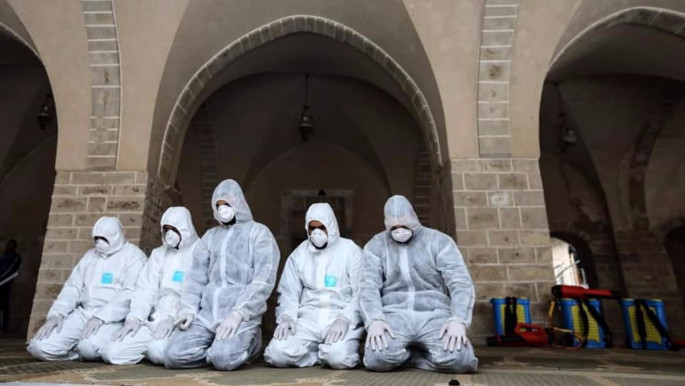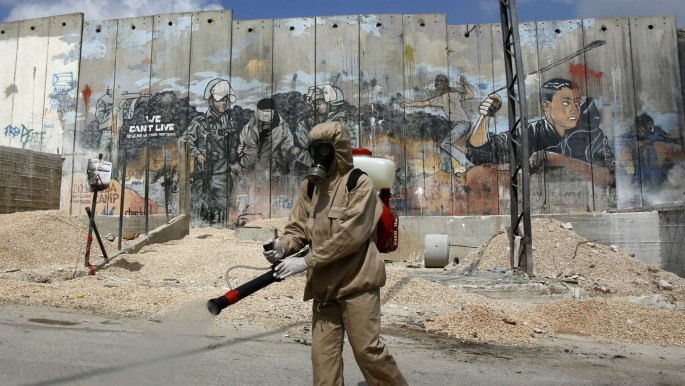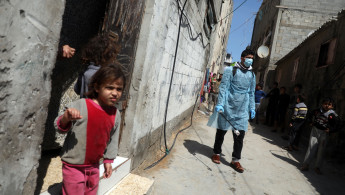What the coronavirus outbreak means for Palestinian refugees
Whilst the virus doesn't choose its victims based on social class or race, it will disproportionally affect the working classes, many communities of colour, and refugees, who all generally have less access to health care or no access at all.
To suggest that the virus will affect us all equally is unfortunately not true, and ignores the structures of inequity and oppression that exist all around us. In a state of global capitalism, crises like these will always affect the poor and marginalised more, as governments and corporations move quickly to implement political agendas and maximise profit.
Naomi Klein explains this as disaster capitalism and predicts that the coronavirus pandemic will be exploited to bail out industries and to push forward with certain political policies.
Read more: The Middle East at war with coronavirus
Palestinian refugees are among some of those most vulnerable to the pandemic in the region. So much so that UNRWA, the UN agency providing necessary services to Palestinian refugees, just launched an emergency 'flash appeal' to raise $14 million in order to respond to the virus in the countries in which it operates - the West Bank and Gaza, Lebanon, Jordan and Syria for three months.
 |
|
| Read more: Panic grips caged Gaza Strip after first coronavirus cases |
UNRWA has already taken pre-emptive measures by closing all 144 of its schools, usually enrolling half a million students. The agency has also set up a medical hotline in an attempt to limit the number of physical visits to their field clinics.
Yet despite these pre-emptive measures and UNRWA's planning and preparation, they could quite easily be overwhelmed should there be an outbreak in any of the fields of operation - even if they do reach the $14 million that they so crucially need.
Most Palestinian refugees are entirely dependent on UNRWA for many health services, either being unable to afford alternatives or being denied state care. In Lebanon, for example, they have been systematically and historically denied access to state services.
Refugee camps all over the world are more at risk of disease and infection at times of pandemics due to over-crowding, a lack of sanitation and generally poor infrastructure.
 |
Refugee camps all over the world are more at risk of disease and infection at times of pandemics due to over-crowding, a lack of sanitation and generally poor infrastructure |  |
Palestinian refugee camps are no different, but the ones within Palestine have the additional factor of having to deal with a repressive Israeli occupation regime which enhances these common problems in camps.
Only a few days ago, photos on social media were shared of Israeli soldiers in protective gear, including gloves and hazmat suits, conducting an arrest raid in Dheisha Camp in Bethlehem.
In Gaza in particular, where out of the 1.9 million population 1.4 million are refugees, there is a real worry that an outbreak would wreak devastation on an unimaginable level.
Read more: Israel abandons suspected Palestinian coronavirus patient at West Bank checkpoint
 |
|
| Read more: Trapped between Israel's occupation and coronavirus |
The UN already dubbed Gaza as 'unliveable' by 2020 due to the dire humanitarian conditions and lack of infrastructure including basic services. This is as a direct result of an Israeli siege and relentless attacks on Gaza over the last 13 years.
Whilst most of the health services around the world are being overwhelmed by the coronavirus, the fragile health sector in Gaza already struggles to treat patients as it is, and many die as a result of not having access to standard treatment.
WHO's Gaza chief estimates that the current infrastructure can handle 300 corona cases over three months, any more than that and doctors will have to make difficult decisions between who gets treatment and who doesn't.
At the time of writing, several cases of coronavirus had been confirmed in Gaza and the Hamas authorities took immediate action to shut down restaurants, cafes and mosques.
 |
For Palestinian refugees, the coronavirus pandemic is an added worry to their already insecure lives |  |
Yet the reality of life under siege means that for the authorities and for the people, their fate lies in the hands of the Israeli regime. Indeed, access to medical supplies and entry for emergency medical personal will all be determined by the Israelis.
For Palestinian refugees, the coronavirus pandemic is an added worry to their already insecure lives. Their perpetual displacement because of Israel's refusal to grant them the right of return to their homes is the root cause of their insecurity.
The people of Gaza demonstrated this with their Great March of Return in 2018 where they marched courageously to the Israeli military fences that cage them in an open-air prison to demand the right of return for Palestinian refugees. Tens of thousands were shot and injured and hundreds were killed.
Thus whilst it is important in a time like this to support humanitarian aid, like the UNRWA appeal, it is just as important to highlight that the Palestinian refugee issue is a political one, and that fulfilment of their internationally enshrined rights is as crucial as ever.
Follow her on Twitter: @yarahawari



